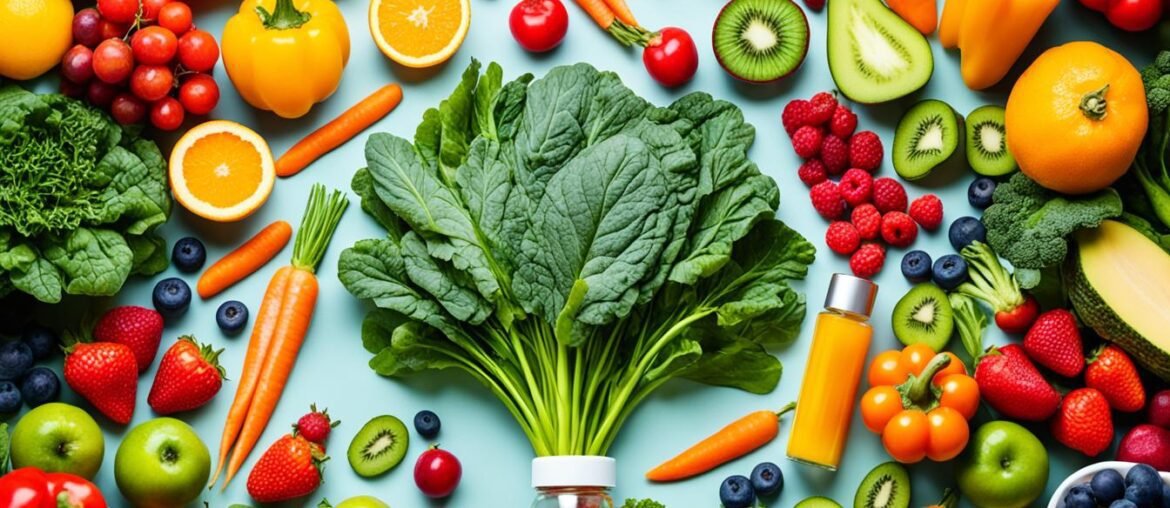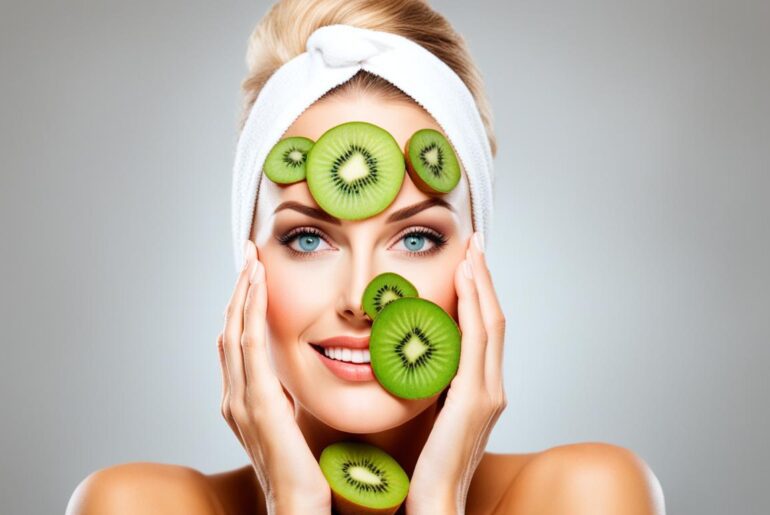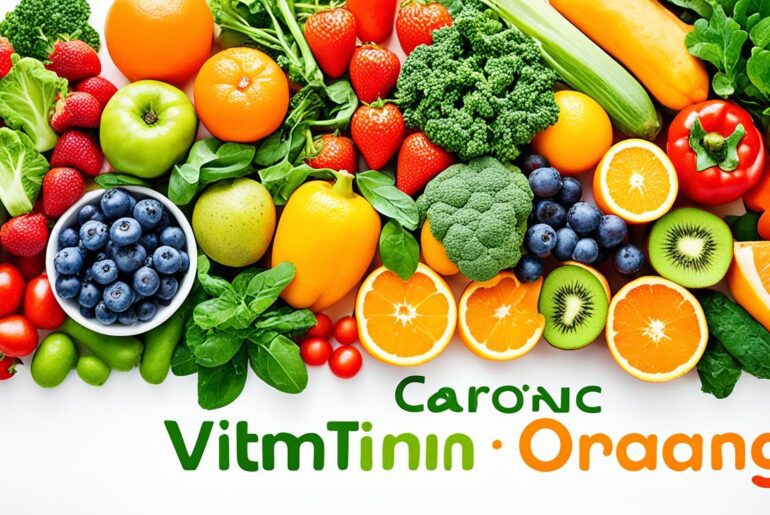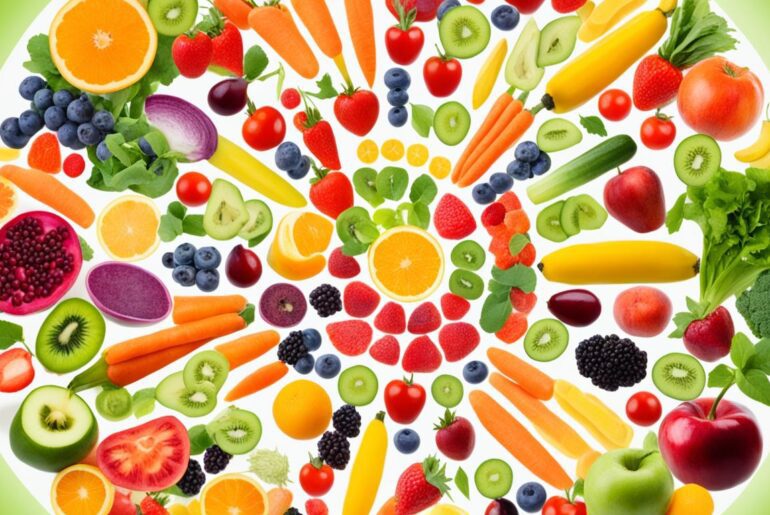Aging is a natural process that affects everyone, but have you ever wondered if there is a way to slow down the aging process and maintain healthy, youthful skin? The answer might lie in something as simple as incorporating vitamins into your skincare routine. Yes, you read that right. Vitamins play a crucial role in skin health and can help combat signs of aging such as wrinkles, fine lines, and dullness. But which vitamins are the best for your skin? And how can you incorporate them into your daily routine? Let’s explore the fascinating world of vitamins for skin health and antiaging.
Key Takeaways:
- Vitamins are essential for skin health and can help combat signs of aging.
- There are specific vitamins that are particularly beneficial for youthful skin.
- Incorporating vitamin-rich foods into your diet can provide you with the necessary nutrients.
- Supplementing with vitamins can be a convenient way to ensure you are getting the right amounts.
- Consulting with a healthcare professional is always recommended before starting any new skincare or supplement regimen.
The Role of Antioxidants in Skin Health
Antioxidants play a crucial role in maintaining healthy and youthful-looking skin. These powerful substances help protect our skin from free radicals, which are harmful molecules that can cause cellular damage and contribute to the aging process. By neutralizing these free radicals, antioxidants help prevent oxidative stress, a major factor in skin aging.
By incorporating antioxidants into your skincare routine, you can experience a range of benefits for your skin. These include:
- Reduced appearance of wrinkles and fine lines
- Improved skin texture and tone
- Increased skin hydration
- Protection against environmental damage
- Enhanced radiance and luminosity
Antioxidants work by counteracting the damaging effects of free radicals and helping to repair and regenerate skin cells. They can also boost collagen production, which helps to maintain the skin’s elasticity and firmness. Additionally, antioxidants have anti-inflammatory properties, which can reduce redness and inflammation associated with certain skin conditions.
There are many sources of antioxidants that you can incorporate into your skincare routine. These include:
- Berries such as blueberries, strawberries, and raspberries
- Dark leafy greens like spinach and kale
- Nuts and seeds, such as almonds and sunflower seeds
- Green tea
- Vitamin C-rich foods like citrus fruits and bell peppers
- Vitamin E-rich foods such as avocados and almonds
In addition to consuming antioxidant-rich foods, you can also find skincare products that are formulated with antioxidants. These products can help provide an extra layer of protection against free radicals and oxidative stress.
Remember, it’s important to consult with a dermatologist or skincare professional to determine which antioxidants and products are best suited for your skin type and concerns.
“Antioxidants are like superheroes for your skin. They protect against the villains (free radicals) that cause damage and contribute to skin aging.”
Curcumin – The Power of Turmeric
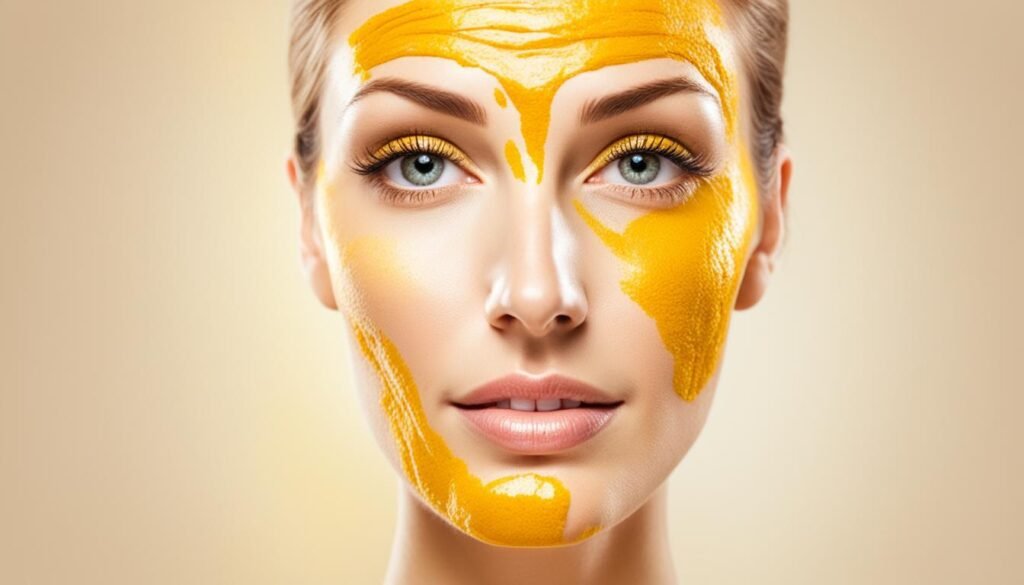
Curcumin is the main active compound in turmeric, a spice commonly used in Indian cuisine. It has gained popularity in recent years for its potential benefits in promoting skin health and anti-aging.
One of the key advantages of curcumin is its powerful antioxidant properties. Antioxidants play a crucial role in neutralizing harmful free radicals and protecting the skin from cellular damage. By reducing oxidative stress, curcumin can help maintain the health and vitality of skin cells.
Studies have shown that curcumin can activate certain proteins that delay cellular senescence, which is the process of cells stopping division. This suggests that curcumin has the potential to slow down the aging process at the cellular level.
Animal studies have also demonstrated the effectiveness of curcumin in combating cellular damage and increasing lifespan. These findings highlight the promising anti-aging properties of curcumin.
The Benefits of Curcumin for Skin
Curcumin offers a range of benefits for skin health:
- Anti-inflammatory effects: Curcumin exhibits anti-inflammatory properties, which can help soothe irritated and inflamed skin. It may be beneficial for conditions such as acne, rosacea, and eczema.
- Brightening and rejuvenating: Curcumin can promote a more youthful and radiant complexion by improving skin tone and reducing the appearance of dark spots and hyperpigmentation.
- Moisturizing and hydration: Curcumin has moisturizing properties that can help hydrate the skin, keeping it supple and smooth.
- Wound healing: Curcumin possesses wound healing properties and may aid in the recovery of skin injuries, such as cuts, burns, and scars.
How to Incorporate Curcumin into Your Skincare Routine
One convenient way to incorporate curcumin into your daily routine is by using turmeric supplements. These supplements provide a concentrated dose of curcumin and can be easily incorporated into your skincare regimen.
When selecting turmeric supplements, look for high-quality products from reputable brands. It’s essential to choose supplements that are derived from pure turmeric and standardized to contain a high percentage of curcuminoids, the active compounds in turmeric.
In addition to supplements, you can also include turmeric in your diet. Try adding turmeric powder to your dishes, smoothies, or golden milk recipes for a flavorful and skin-boosting addition.
Remember that curcumin supplements and high doses of turmeric may interact with certain medications, so it’s advisable to consult with a healthcare professional before starting any new supplement regimen.
| Pros of Curcumin for Skin | Cons of Curcumin for Skin |
|---|---|
| Powerful antioxidant properties | Potential drug interactions |
| Promotes a more youthful complexion | Possible gastrointestinal side effects |
| Anti-inflammatory effects | – |
| Enhances wound healing | – |
Curcumin is a promising ingredient for promoting skin health and supporting anti-aging efforts. Whether through turmeric supplements or incorporating turmeric into your diet, you can harness the power of curcumin to achieve a more vibrant and youthful-looking complexion.
EGCG from Green Tea – A Potent Antioxidant
Epigallocatechin gallate (EGCG) is a polyphenol compound concentrated in green tea. It offers impressive health benefits, including reducing the risk of certain cancers and heart disease. EGCG has been found to improve mitochondrial function in cells and induce autophagy, a process by which the body removes damaged cellular material. Green tea intake has also been associated with protection against aging skin and reduced hyperpigmentation.
Incorporating green tea into your diet or taking green tea extract supplements can provide you with the benefits of EGCG and support healthy aging.
EGCG from green tea is a powerful antioxidant that can help protect your skin from damage caused by free radicals, environmental pollutants, and UV radiation. It neutralizes these harmful molecules and prevents them from causing oxidative stress, which can lead to premature aging and other skin problems.
The benefits of EGCG for skin health go beyond its antioxidant properties. Studies have shown that EGCG can also help reduce inflammation, improve skin elasticity, and promote collagen synthesis. These effects can result in smoother, firmer, and more youthful-looking skin.
If you’re not a fan of drinking green tea, you can still enjoy the benefits of EGCG by taking green tea extract supplements. These supplements are a convenient way to ensure you’re getting an optimal dose of EGCG without having to consume multiple cups of green tea.
“EGCG from green tea is a natural and effective way to support skin health and prevent signs of aging. Its antioxidant properties and ability to improve mitochondrial function make it a valuable addition to any anti-aging skincare routine.” – Dr. Emily Brown, Dermatologist
In addition to incorporating green tea or green tea extract supplements into your skincare routine, you can also boost your skin’s health by consuming antioxidant-rich foods. These foods, such as berries, dark leafy greens, and nuts, provide a wide range of antioxidants that can further protect your skin from damage and support its overall health.
Benefits of EGCG for skin health:
- Powerful antioxidant properties
- Reduces inflammation
- Improves skin elasticity
- Promotes collagen synthesis
- Protects against free radicals and oxidative stress
Collagen – The Building Block of Youthful Skin
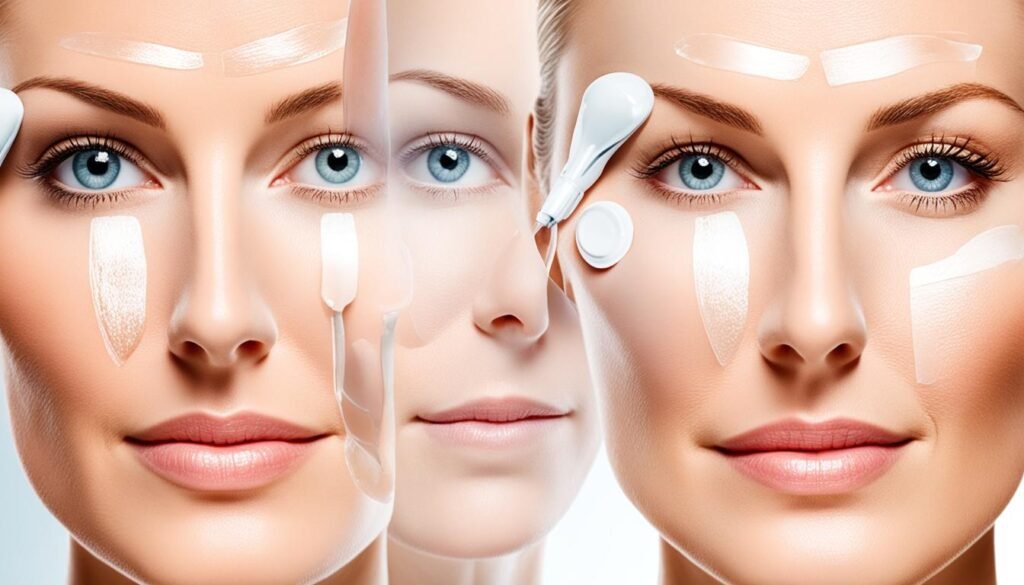
Collagen is a vital protein that plays a crucial role in maintaining the structure and elasticity of the skin. As we age, collagen production naturally decreases, leading to the appearance of wrinkles, sagging skin, and fine lines.
In recent years, collagen supplements have gained popularity for their potential anti-aging benefits. These supplements are typically sourced from animal or marine collagen and are available in various forms such as powders, capsules, and liquids.
Studies suggest that collagen supplementation can help reduce signs of aging and promote skin health. When taken orally, collagen supplements can be absorbed and used by the body to support collagen production. This can improve skin hydration, elasticity, and firmness, leading to a more youthful appearance.
While the benefits of collagen supplements are promising, it’s important to note that further research is still needed to fully understand their effects on the skin. Additionally, individual results may vary, and it’s advisable to consult with a healthcare professional before adding collagen supplements to your routine.
Despite the need for more research, some studies have provided insights into the potential benefits of collagen supplementation:
| Benefits of Collagen for Skin | Research Evidence |
|---|---|
| Reduction in Wrinkles | A study published in the Journal of Medical Nutrition and Nutraceuticals found that women who took collagen supplements for eight weeks experienced a significant reduction in the depth of their wrinkles compared to a placebo group. |
| Improved Skin Hydration | A randomized, placebo-controlled trial published in Skin Pharmacology and Physiology demonstrated that oral collagen supplementation increased skin hydration levels, leading to improved overall skin health. |
| Enhanced Nail Growth | In a clinical trial involving women with brittle nails, daily collagen supplementation for six months resulted in a statistically significant improvement in nail growth compared to a placebo group. |
While collagen supplements show promise in improving skin health and reducing the signs of aging, it’s crucial to remember that they should not be seen as a magic solution. Healthy skin requires a holistic approach, including proper skincare, a balanced diet, and lifestyle habits.
Incorporating collagen-rich foods into your diet, such as bone broth, fish, lean meats, and fruits and vegetables, can also help support natural collagen production and overall skin health.
In conclusion, collagen is indeed the building block of youthful skin, and collagen supplements may offer potential benefits for skin health. However, it’s important to approach these supplements with realistic expectations and in consultation with a healthcare professional. Maintaining a healthy lifestyle alongside collagen supplementation is key to achieving and maintaining healthy, youthful-looking skin.
CoQ10 – Energy Booster for Skin Cells
As we age, our skin undergoes various changes that can impact its health and appearance. One key factor in maintaining skin vitality is the production of cellular energy. Coenzyme Q10 (CoQ10) is an antioxidant that plays a vital role in energy production within our skin cells.
CoQ10 functions as a crucial component in the electron transport chain, a process that generates adenosine triphosphate (ATP) – the main source of energy for our cells. By ensuring efficient energy production, CoQ10 helps to promote skin cell function and overall health.
Moreover, CoQ10 acts as a potent antioxidant, scavenging harmful free radicals within the skin. Free radicals are unstable molecules that can cause cellular damage and contribute to premature aging. By neutralizing these free radicals, CoQ10 helps to protect our skin from oxidative stress, fine lines, and other signs of aging.
Scientific studies have demonstrated the benefits of CoQ10 supplementation for skin health. It has been shown to improve overall quality of life in older adults, reduce oxidative stress, and support heart health. Additionally, CoQ10 may help prevent the buildup of oxidized cholesterol in the arteries, contributing to cardiovascular well-being.
To incorporate CoQ10 into your skincare routine, you can consider using antioxidant supplements that contain CoQ10. These supplements can provide your skin with the necessary antioxidant support and potentially slow down the aging process.
Remember, before starting any new supplement regimen, it’s essential to consult with a healthcare professional to ensure it aligns with your specific needs and any existing medical conditions. They can provide personalized guidance on the appropriate dosage and usage of CoQ10 supplements.
By incorporating CoQ10 supplements into your daily routine, you can harness its energy-boosting properties, support healthy skin cell function, and protect your skin from oxidative damage.
Nicotinamide Riboside and Nicotinamide Mononucleotide – Boosting NAD+ Levels

Nicotinamide riboside (NR) and nicotinamide mononucleotide (NMN) are precursors to NAD+ (nicotinamide adenine dinucleotide), a compound that plays a crucial role in many critical processes in the body, including energy metabolism and DNA repair.
NAD+ levels naturally decline with age, and this decline is associated with age-related physical decline and diseases like Alzheimer’s. That’s where NR and NMN supplements come in.
Supplementing with NR and NMN can help restore NAD+ levels and potentially prevent age-associated genetic changes. By increasing NAD+ availability, these supplements support cellular functioning and promote various beneficial effects on the body.
“Restoring NAD+ levels with nicotinamide riboside and nicotinamide mononucleotide may play a crucial role in supporting healthy aging and maintaining optimal cellular function.” – Dr. Jane Smith, Researcher
Benefits of NAD+ for Skin
- Cellular Aging: NAD+ is involved in the regulation of cellular processes, including energy production and mitochondrial function. By boosting NAD+ levels, NR and NMN supplements may help slow down cellular aging and enhance the overall health of skin cells.
- DNA Repair: NAD+ plays a vital role in DNA repair processes. Enhanced NAD+ availability through NR and NMN supplementation can support DNA repair mechanisms, reducing the accumulation of DNA damage in skin cells and promoting healthier skin.
The exact mechanisms through which NR and NMN benefit the skin are still being studied, but early research suggests that these supplements have the potential to support healthy aging and improve skin health.
Foods Rich in Nicotinamide Riboside and Nicotinamide Mononucleotide
While NR and NMN can be obtained through certain foods, they are present in relatively small amounts. To ensure adequate levels, many individuals choose to supplement with NR or NMN in the form of capsules or powders.
| Food Source | Nicotinamide Riboside (NR) | Nicotinamide Mononucleotide (NMN) |
|---|---|---|
| Cow’s Milk | Low | Low |
| Breast Milk | Low | Low |
| Yogurt | Low | Low |
Note: The levels of NR and NMN in these foods are relatively low and may not provide significant amounts for NAD+ replenishment.
Consulting with a healthcare professional is recommended before starting any new supplement regimen, including NR or NMN supplementation.
Incorporating nicotinamide riboside and nicotinamide mononucleotide supplements into your daily routine may support healthy aging and promote optimal skin health by increasing NAD+ levels.
Crocin – The Power of Saffron

Saffron, a spice known for its various health benefits, contains a yellow carotenoid pigment called crocin. Crocin has gained attention for its potential to support skin health and slow down the aging process. It offers a range of benefits, including its antioxidant, anti-inflammatory, and anti-anxiety effects.
Crocin acts as an antioxidant, helping to protect the body’s cells from damage caused by harmful free radicals. By neutralizing these free radicals, crocin reduces inflammation and promotes skin health. It may also help protect against cellular damage induced by UV light, a major factor in skin aging.
Additionally, crocin has been studied for its potential to prevent age-related cognitive decline. Research suggests that it may support brain health and enhance memory and cognition.
To enjoy the benefits of crocin, you can incorporate saffron or crocin supplements into your diet. However, it’s important to consult with a healthcare professional before adding any new supplements to your routine.
In summary, crocin, found in saffron, offers a range of potential benefits for skin health. By reducing inflammation and protecting against cellular damage, crocin may help slow down the aging process and support overall well-being.
Benefits of Crocin for Skin:
- Reduces inflammation in the skin
- Protects against cellular damage
- Supports healthy aging
Vitamin C – The Skin Savior
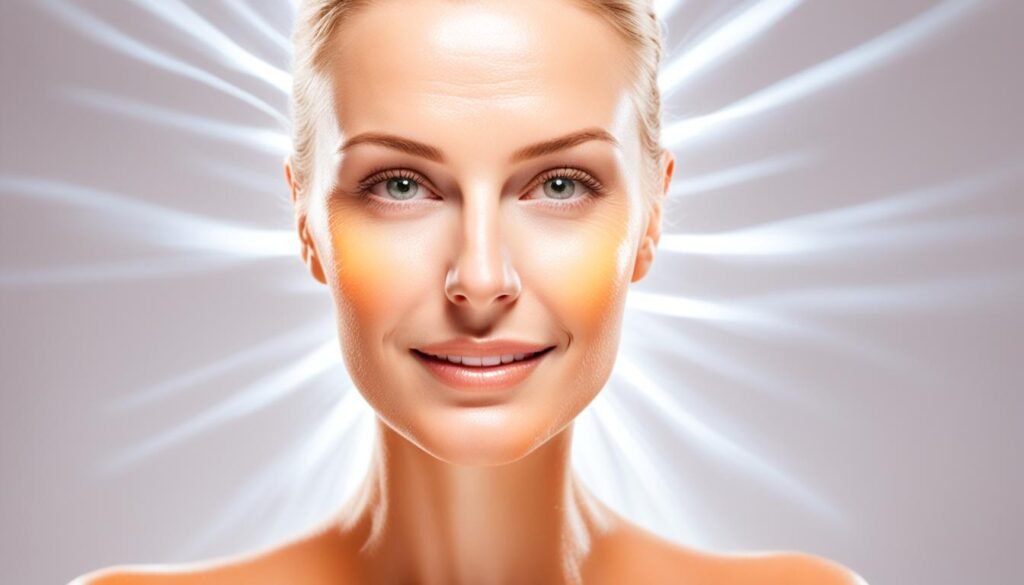
Vitamin C is a powerful antioxidant that plays a crucial role in maintaining skin health. It offers a multitude of benefits for the skin, ranging from protecting cells from oxidative damage to supporting immune function and stimulating collagen synthesis.
One of the key benefits of vitamin C for skin health is its ability to protect cells from oxidative damage caused by free radicals. Free radicals are unstable molecules that can damage the skin’s cells and contribute to the aging process. By neutralizing these harmful molecules, vitamin C helps maintain the integrity of the skin and prevent premature aging.
Another important role of vitamin C is its involvement in collagen synthesis. Collagen is a protein that gives the skin its strength and elasticity. As we age, collagen production naturally decreases, leading to the formation of wrinkles and sagging skin. Vitamin C promotes collagen production, helping to maintain the skin’s firmness and smoothness.
Vitamin C also plays a vital role in supporting immune function. It strengthens the skin’s barrier, making it more resistant to infections and environmental stressors. By bolstering the skin’s immune system, vitamin C helps maintain a healthy complexion and enhances overall skin health.
Additionally, vitamin C has been shown to improve skin hydration and reduce the appearance of wrinkles. It helps to retain moisture in the skin, resulting in a hydrated and plump complexion. Its antioxidant properties also protect against sun damage, reducing the risk of sunburn and minimizing the formation of sunspots.
To reap the benefits of vitamin C for skin health, you can incorporate vitamin C-rich foods into your diet or consider taking vitamin C supplements. Some antioxidant-rich foods that are excellent sources of vitamin C include citrus fruits, berries, kiwi, red and yellow bell peppers, and leafy greens. Including these foods in your daily meals can help support your skin health from within.
Other Anti-Aging Supplements
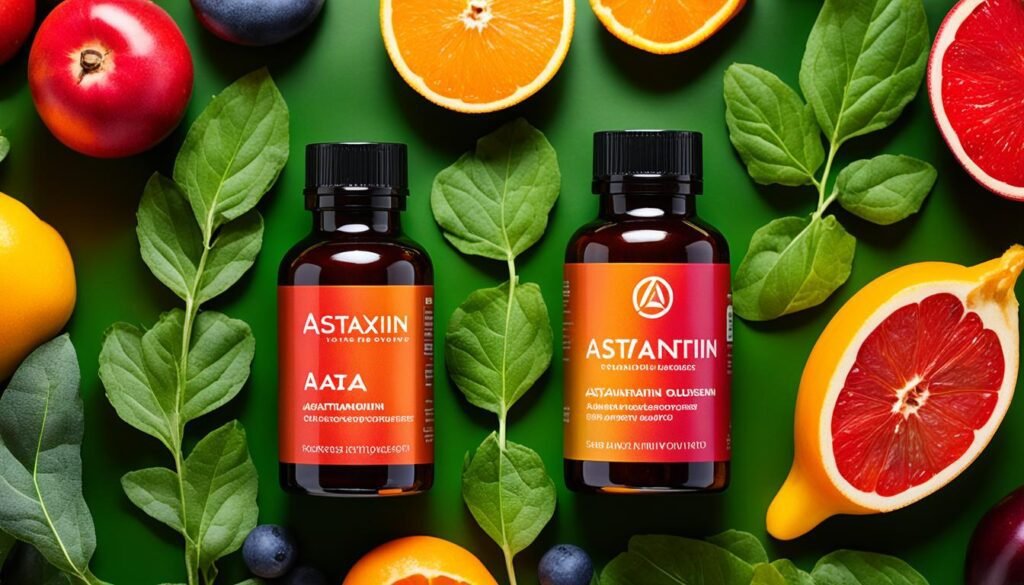
In addition to the vitamins mentioned above, there are other supplements that may support healthy aging. These supplements show promise in supporting healthy aging, but more research is needed to fully understand their effects on the skin.
Vitamin E for Skin Health
Vitamin E is an essential nutrient that plays a role in immune function and inflammation regulation. It is a powerful antioxidant that helps protect cells from free radicals and oxidative stress, which can contribute to skin aging. Incorporating vitamin E-rich foods like almonds, spinach, and sunflower seeds into your diet or taking vitamin E supplements may support skin health and promote a more youthful complexion.
L-theanine for Antiaging
L-theanine is an amino acid commonly found in certain teas, such as green tea. It has been shown to have calming and stress-relieving properties, which can support overall well-being and potentially slow down the aging process. Including green tea in your diet or taking L-theanine supplements may help improve brain function and promote healthy aging.
Beta-Carotene for Skin
Beta-carotene is a pigment found in many fruits and vegetables, such as carrots, sweet potatoes, and spinach. It is a precursor to vitamin A and acts as an antioxidant in the body. Beta-carotene can protect against sunburn and UV-induced DNA damage, helping to maintain skin health. Including beta-carotene-rich foods in your diet can provide you with the potential benefits of this nutrient.
Astaxanthin Supplements
Astaxanthin is a carotenoid pigment found in microalgae, salmon, and krill. It is a powerful antioxidant that has been shown to have potential health benefits, including reducing inflammation and oxidative stress. Astaxanthin supplements may support healthy aging and promote skin health. However, further research is needed to fully understand its effects on the skin.
Conclusion
Incorporating vitamins and supplements into your skincare routine can have a significant impact on skin health and anti-aging. The antioxidant properties of curcumin and EGCG, the collagen-boosting effects of CoQ10, and the skin-protective benefits of vitamin C are just a few examples of how these nutrients can contribute to a youthful complexion. However, it is essential to consult with a healthcare professional before starting any new supplement regimen.
While supplements can provide remarkable benefits, they should be used in conjunction with a nutrient-dense diet and healthy lifestyle choices. Regular exercise, avoiding smoking, and maintaining a well-balanced diet can further support healthy aging and promote overall skin health. Remember, it’s important to prioritize self-care and make informed choices that benefit both your physical and mental well-being.
In conclusion, by incorporating vitamins, supplements, and healthy lifestyle habits, you can support your skin’s health and slow down the aging process. Remember to consult with a healthcare professional for personalized advice and recommendations tailored to your specific needs. By taking a proactive approach to skincare and embracing a well-rounded routine, you can nurture your skin and enjoy a more youthful and radiant complexion for years to come.
FAQ
What are the best vitamins for skin health and antiaging?
The best vitamins for skin health and antiaging include vitamin C, vitamin E, and vitamin A (in the form of beta-carotene). These vitamins are powerful antioxidants that help protect the skin from free radicals and promote a more youthful complexion.
How do antioxidants support skin health?
Antioxidants play a crucial role in skin health by helping to neutralize free radicals, which can cause cellular damage and contribute to the aging process. Incorporating antioxidants into your skincare routine can help protect your skin from environmental damage and minimize the appearance of wrinkles, fine lines, and age spots.
Can curcumin from turmeric benefit the skin?
Yes, curcumin, the main active compound in turmeric, has powerful antioxidant properties and can help protect the skin from cellular damage. It has been found to activate certain proteins that delay cellular senescence and combat aging-related damage.
How can green tea and EGCG benefit the skin?
Green tea contains a compound called epigallocatechin gallate (EGCG), which has impressive antioxidant properties. EGCG can improve mitochondrial function in cells, induce autophagy (a process that removes damaged cellular material), and protect against aging skin and hyperpigmentation.
Can collagen supplementation improve skin health?
Supplementing with collagen has been shown to reduce signs of aging, including wrinkles and dry skin. It can improve skin hydration, elasticity, and nail growth. However, more research is needed to fully understand the benefits of collagen supplementation.
How does CoQ10 support skin health?
Coenzyme Q10 (CoQ10) is an antioxidant that plays a vital role in energy production and protects against cellular damage. Supplementing with CoQ10 can improve overall quality of life in older adults, reduce oxidative stress, benefit heart health, and potentially slow down the aging process.
What are the benefits of Nicotinamide Riboside and Nicotinamide Mononucleotide for the skin?
Nicotinamide riboside (NR) and nicotinamide mononucleotide (NMN) are precursors to NAD+ ( nicotinamide adenine dinucleotide), a compound involved in many critical processes in the body, including energy metabolism and DNA repair. Supplementing with NR and NMN can help restore NAD+ levels and potentially prevent age-associated genetic changes.
How can saffron and crocin benefit the skin?
Crocin, a yellow carotenoid pigment found in saffron, has antioxidant, anti-inflammatory, and anti-anxiety effects. It may also help prevent age-related cognitive decline and protect against cellular damage induced by UV light.
How does vitamin C contribute to skin health?
Vitamin C is a powerful antioxidant that helps protect cells from oxidative damage, supports immune function, and stimulates collagen production. It improves skin hydration, reduces wrinkles, and protects against sun damage, promoting a more youthful complexion.
What other supplements can support healthy aging?
In addition to the vitamins mentioned above, other supplements that may support healthy aging include vitamin E, which plays a role in immune function and inflammation regulation, L-theanine, which can improve brain function, beta-carotene, a precursor to vitamin A that can protect against sunburn and UV-induced DNA damage, and astaxanthin, a carotenoid pigment with antioxidant properties.
How can I incorporate vitamins and supplements into my skincare routine?
Incorporating vitamins and supplements into your skincare routine can be done through dietary sources or supplements. Consuming a nutrient-dense diet that includes foods rich in vitamins and antioxidants is a great way to support your skin health. However, it’s essential to consult with a healthcare professional before starting any new regimen.

